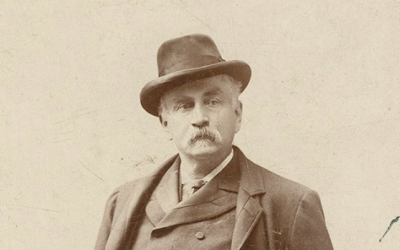These days, fairs promote entertainment, but when Nebraska was a new state, fairs were mostly seen as a way to promote Nebraska by demonstrating its potential for agriculture.
In 1874 the state fair was held in Omaha. Earlier that year J. Sterling Morton (future US Secretary of Agriculture and founder of Arbor Day) sent an appeals to newspapers around the state. As printed in the Nebraska Herald (Plattsmouth) on May 21, 1874, Morton described the coming fair as “a complete demonstration of the wonderful fertility of Nebraska soil, and its perfect adaptability to the production of all cereals, root crops and fruits incident to this latitude.”
He wanted to Nebraskans to get involved. “Every citizen has an interest in helping to the best of his ability, and each farmer in the State will certainly have some product worthy of exhibition.”
He wanted people to make a point of producing examples that could serve as bragging points.
“If without especial effort seventy and eighty bushels of corn is frequently raised upon an acre of ground, why not by extra tillage, produce an hundred bushels, and even an hundred and forty of the same grain upon the same breadth of land?”
The fair would showcase these agricultural wonders, but this was about more than the fair itself. Morton and others believed that by demonstrating the upper limits of the land’s productivity, prize-winning farmers would generate publicity to entice more people to settle in Nebraska and invest money here.
This wasn’t just about blue ribbons, in other words, though Morton promised that the “premiums [cash prizes] offered by the State Board of Agriculture are liberal and will be promptly paid.” The railroads, too, were offering “special inducements, as purchasers, at rich and remunerative rates, of specimens and samples from all premium or extraordinary large and fine crops.”
Unfortunately, 1874 was a bad year for Rocky Mountain locusts. They descended in huge swarms across the Great Plains, darkening the skies and eating up everything wherever they landed. The state fair went on as scheduled, but you can bet the fair’s promoters had nothing to say about it. That wasn’t the sort of record bounty the fair existed to promote.



